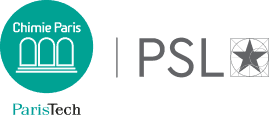Physico-Chemistry and Interfaces
Final written exam
The first part of the PCI course recalls the concepts necessary for the study of chemical equilibria, emphasizing the notion of chemical potential and intensive molar quantities particularly derived from thermodynamics in terms of enthalpy, free enthalpy and entropy. We will use thermodynamics to relate a priori independent properties and express the effects of variables such as temperature and pressure. We will apply these concepts to gases and ionic solutions and binary mixtures, emphasizing the notion of ideality and non-ideality. We will see how to develop valid models for real behaviours (van der Waals, Debye-Huckel models, regular solutions for example) based on ideality laws. The notion of activity and activity coefficients will be at the heart of this part, while relying on concrete applications of measurements and determination. Colligative properties will also be discussed.
Then, we will introduce thermodynamic phenomena to liquid surfaces by developing the concepts of surface tension, capillarity, contact angle. The thermodynamic and kinetic bases of colloid stability will also be presented.
Online self-assessment tests are regularly offered to students.
To give the future engineer a basic skill, complementary to his training in physico-chemistry, on the acquired bases of thermodynamics.
For the future engineer, this will be:
– Understand and describe a real system based on the basics of the ideal system, gaseous or in solution.
– Understand and assimilate phenomena at the interfaces.
– Acquire the notion of metastability (e.g. emulsions and colloids
Teaching language: FR
Documents:
pdf documents, handouts
Link: https://coursenligne.chimie-paristech.fr/enrol/index.php?id=8
